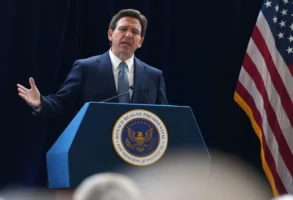
Published March 1, 2015
The battle over the College Board’s standards for its Advanced Placement (AP) U.S. History course reflects not only our political polarization but also some profound moral disputes. Defenders of the new course dismiss its critics as people who want to sanitize America’s past. But that response is off target. The real issue is whether the curriculum will teach a dogmatic progressivism or introduce students to a variety of opinions about the individuals, ideas and institutions that shaped American history.
Are we a country that models and defends liberty for the world, or should we be a humbler and more collaborative member of the family of nations? Shall we hold equality as a universal standard of right derived from nature or from God? Or are the principles set forth in the Declaration of Independence merely cultural preferences whose universalization entails the domination of others?
These and other such questions divide Americans and are worth thoughtful examination. But the new framework for the teaching of AP U.S. History encourages nothing of the kind. It simply echoes the more liberal or left-leaning answers.
The bias is obvious in some places, as when the 19th-century belief in manifest destiny is presented as a regrettable example of “cultural superiority,” rather than an attempt to expand and defend the realm of liberty.
Elsewhere the bias is subtle, as when Cold War debates are framed as disagreements over how much power to grant the “military-industrial complex,” instead of how strongly to stand against the Soviet threat. Liberal activists are portrayed as “responding to alarming environmental problems,” whereas conservatives are depicted as “fearing delinquency, unrest, and challenges to the family.” Why not present conservatives as responding with reason rather than fear to significant increases of crime and divorce? More hawkish U.S. foreign policy is typically described as the subject of vigorous debate, while developments such as the student counterculture of the 1960s are presented as uncontroversial progress.
The framework omits or downplays key themes, as with John Winthrop’s exceptionalist call for the Massachusetts Bay Colony to stand as an exemplary “city upon a hill” and the many echoes of his speech in later history. By diverting attention from the colonies to a globalized “Atlantic World,” the framework shifts the moral center of early American history away from the democratic and religious settlements of New England. The new focus is the South’s plantation system, with its entanglement in the international slave trade. The opening of the West becomes a virtual footnote to the treatment of the Indians.
The virtues of the free enterprise system are all but absent, while its failings are relentlessly chronicled. Federal action is invariably portrayed as necessary and successful. The rise of conservatism under President Ronald Reagan, in contrast, is pegged to a public soured on economic troubles and foreign decline. Nowhere is it suggested that many Americans turned against big government in response to the failings of President Lyndon B. Johnson’s anti-poverty programs.
In general, the framework elevates material causes over the moral and philosophical principles that undergird our constitutional democracy.
The College Board unleashed this storm of controversy when it replaced a simple six-page outline of topics to be covered in the course with 70-plus pages of thematic and conceptual directives. Before, the class could be taught to taste by liberals, conservatives or anyone in between. Now the College Board’s favored conception of American history governs. The token flexibility for teachers that remains is constrained within tight intellectual lines drawn by the College Board.
The College Board rightly notes that the new framework follows the latest scholarly developments. Yet these trends themselves are governed more by politics than evidence. History is not physics. Historical inquiry is everywhere shaped by moral choices that cannot themselves be derived from facts alone. To criticize the biases of the new AP history framework is not to “censor” the one true history as objectively discerned by today’s scholars. Rather, it demands acknowledgment of the ongoing moral debate that helps shape our national story.
The solution is federalism. Now that the College Board is effectively making the sort of curricular decisions traditionally left to states, its monopoly on advanced-placement testing must end. Even the over-nationalized Common Core offers states a choice between two testing consortia. As states continue to voice concern with the new AP U.S. History framework, competing testing companies with alternative history frameworks are bound to emerge.
The new AP U.S. History framework downplays the free market and federalism, but these are resources that earlier generations have bequeathed to us for occasions when great moral disagreements divide the country. This is a very good moment to rediscover some U.S. history.
Stanley Kurtz is a senior fellow at the Ethics and Public Policy Center.








